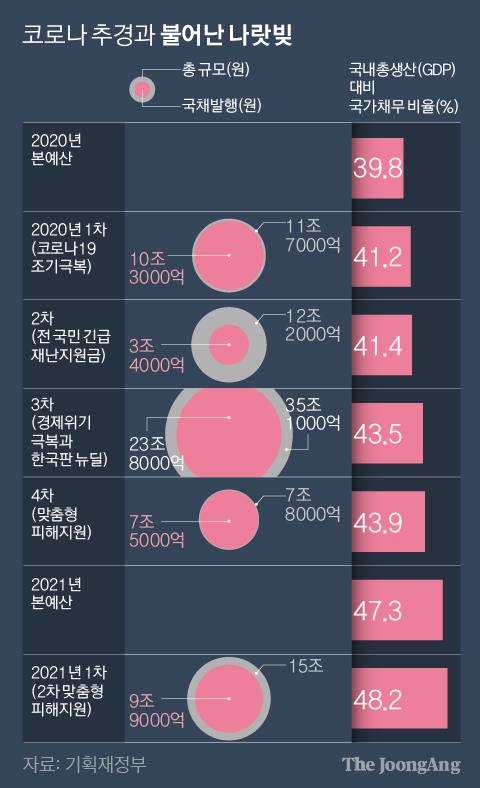This is the fifth time that the government has owed a debt through the’extra corona’. Of the total support measures amounting to 19 trillion won announced by the government on the 2nd, 15 trillion won is an additional budget (additional) funding. The scale has increased, reflecting the ruling party’s determination to be larger than the original proposal of the Ministry of Strategy and Finance, which was 12 to 13 trillion won.
Debt-to-GDP ratio increased to 48.2%
Namki Hong “The current speed is around 50% within 2-3 years”

Corona supplementation and growing debt. Graphic = Reporter Park Kyung-min [email protected]
Among them, 9.9 trillion won will be covered by issuing government bonds, and the remaining 5 trillion won will be spent on surpluses and funds carried over. Accordingly, this year’s national debt will increase to 96.9 trillion won, and the ratio of national debt to gross domestic product (GDP) will increase from 47.3% to 48.2%.
Deputy Prime Minister Hong Nam-ki and Minister of Strategy and Finance expressed concerns about fiscal soundness when announcing an additional note on the same day. He posted on Facebook, “It took 7 to 9 years for our country’s national debt ratio to reach from 20% to 30% and from 30% to 40%. It will take only two to three years to reach it.” “In our case, it should not be overlooked that fiscal expenditure may increase rapidly due to the trend of slowing growth in the mid- to long-term, responding to ultra-low birth rates, the advent of an ultra-aged society, and special circumstances prepared for unification. I can’t.”
Despite the government’s consciousness of problems, specific plans for debt repayment are not clear. Professor Ahn Dong-hyun of the Department of Economics at Seoul National University advised, “Since a one-time project such as a disaster subsidy is not a project to increase economic growth or tax income, there should be a plan to reduce expenditures later in areas that are not urgent.” Professor Ok Dong-seok of the Department of Trade at Incheon National University also pointed out that “Although the previous government increased fiscal expenditures, it accompanied fiscal reforms such as the National Pension and Public Service Pension, but the Moon Jae-in administration has no financial plan for the future.”
Sejong = Reporter Seongbin Lim [email protected]
![]()
